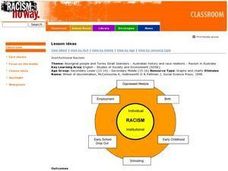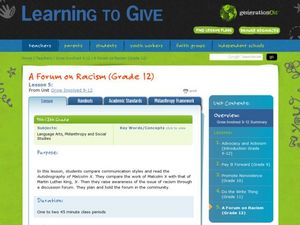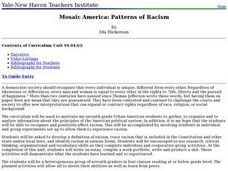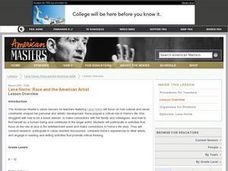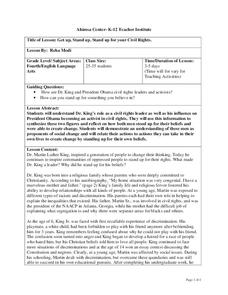Curated OER
Institutional Racism
Students define institutional racism and consider its effects on various groups in society. They discuss what other groups besides Indigenous Australians have experienced institutional racism in Australia? Students research...
Curated OER
A Forum on Racism
Twelfth graders compare and contrast the work of Malcolm X and Martin Luther King, Jr. In this racism lesson, 12th graders read The Autobiography of Malcolm X and discuss how Malcolm X and Martin Luther King, Jr. approached ending racism.
Curated OER
Racism: Law and Attitude
Students examine discrimination laws. In this racism instructional activity, students compare and contrast de facto and de jure discrimination. Students also explore the Bill of Rights and determine what makes some acts and speech illegal.
Curated OER
Mosaic America: Patterns of Racism
Seventh graders use print and electronic resources to gather and analyze information on the political system in the United States. Using the Constitution, they identify and discuss instances of racism included in amendments and laws. ...
Curated OER
Racism and the Box
Students examine racism and how it relates to self-deception. They identify the effect of racism on society. They reflect on the lesson by writing a paragraph about discrimination and racism.
Curated OER
A New Generation of Fighters
Middle schoolers discuss the reasons why people are less likely to take a stand on issues today than they were in the past. In groups, they research the efforts of Kings, Parks and others to end discrimination and racism. They read...
American Institute of Physics
The Physical Sciences at Historically Black Colleges and Universities
The history of science instruction at Historically Black Colleges and Universities (HBCUs) is the focus of a lesson that explores the early challenges these institutions faced in accessing equipment for their labs and instructors for...
Curated OER
You and the Law -- Beating the Odds
Students examine the rate of institutional racism in the United States. Individually, they write in their journals about how they can make better choices and increase their self-esteem. Using historical documents, they identify the...
Facing History and Ourselves
The Importance of a Free Press
"Congress shall make no law . . . abridging the freedom of speech, or of the press;. . ." Why is this guarantee of free speech and a free press the First Amendment to the US Constitution? Why are these rights so essential to a...
University of Southern California
Persecution of the German-Jews: The Early Years - 1933-1939
Young historians learn about the dehumanization process of stripping German Jews of basic, fundamental rights prior to the genocide of European Jews in the 1940s. Learners watch video clips of survivors who recount such events...
Children's Museum of Indianapolis
Anne Frank: Facing Hatred, Daring to Dream
The stories of Anne Frank, Ruby Bridges, and Ryan White illustrate the power of children to make a difference. The three lesson in this must-have resource are designed to inspire young people to make a difference in their world....
Smithsonian Institution
African American Pioneers in Aviation
Bessie Coleman. William Powell. Willa Brown. Benjamin O. Davis, Jr. While these names may not be familiar to many Americans, they are African American pioneers in aviation history. Class members have an opportunity to research the...
Anti-Defamation League
Shirley Chisholm: Unbought, Unbossed and Unforgotten
A 13-page packet introduces high schoolers to a lady of amazing firsts. Shirley Chisholm was the first Black woman elected to Congress, the first Black woman to run for President of the United States, and a leader of the Women's Rights...
Curated OER
The Heritage of Puerto Rico and Cuba
Students examine the influences of the Hispanic culture in the United States. In groups, they read about the life of a slave in Cuba and identify the misconceptions are discussed. As a class, they define racism, read an essay and...
Curated OER
Martin Luther King Jr. Who Is He?
Students describe MLk's leadership of the desegregation movement. Students discuss the meaning of non-violent revolution. Students identify the difference between their lives and those ofcitizens in 1963. Students write a short essay...
Curated OER
Remember
Seventh graders mention any recent racism or discrimination they have seen placed on an ethnic group other than their own. After reading an autobiography, they read and write poems based on past events in the Hispanic culture. They are...
Curated OER
Human Rights And Refugees: The Right To Asylum
Students read the Universal Declaration of Human Rights, define asylum and identify when people have the right to asylum. They examine specific cases of asylum in recent times and consider some of the difficulties refugees face.
Curated OER
Lena Horne: Race and the American Artist
Students examine how race played a critical role in Lena Horne's life. They conduct Internet research, participate in a class debate, write a letter, and create a presentation based on their Internet research.
Curated OER
An Analysis of Jim Crow Laws and their Effects on Race Relations
First graders analyze the role of the Jim Crow laws on race relations. As a class, they are segregated based on the color shirt they have or some other simple criteria and wear either a square or circle sticker representing the majority...
Curated OER
The Power of Protest
Pupils explain how Rosa Parks refused to give up her bus seat to a white man. They discuss how her actions were heroic and how they affected the civil rights movement. They reflect on the lesson in journal entries.
Curated OER
Get up, Stand up. Stand up for your Civil Rights.
Fourth graders study civil rights leaders. In this Civil Rights lesson, 4th graders investigate what it means to stand up for something you believe in after reading about Dr. Martin Luther King Jr. and President Obama. Students create a...
